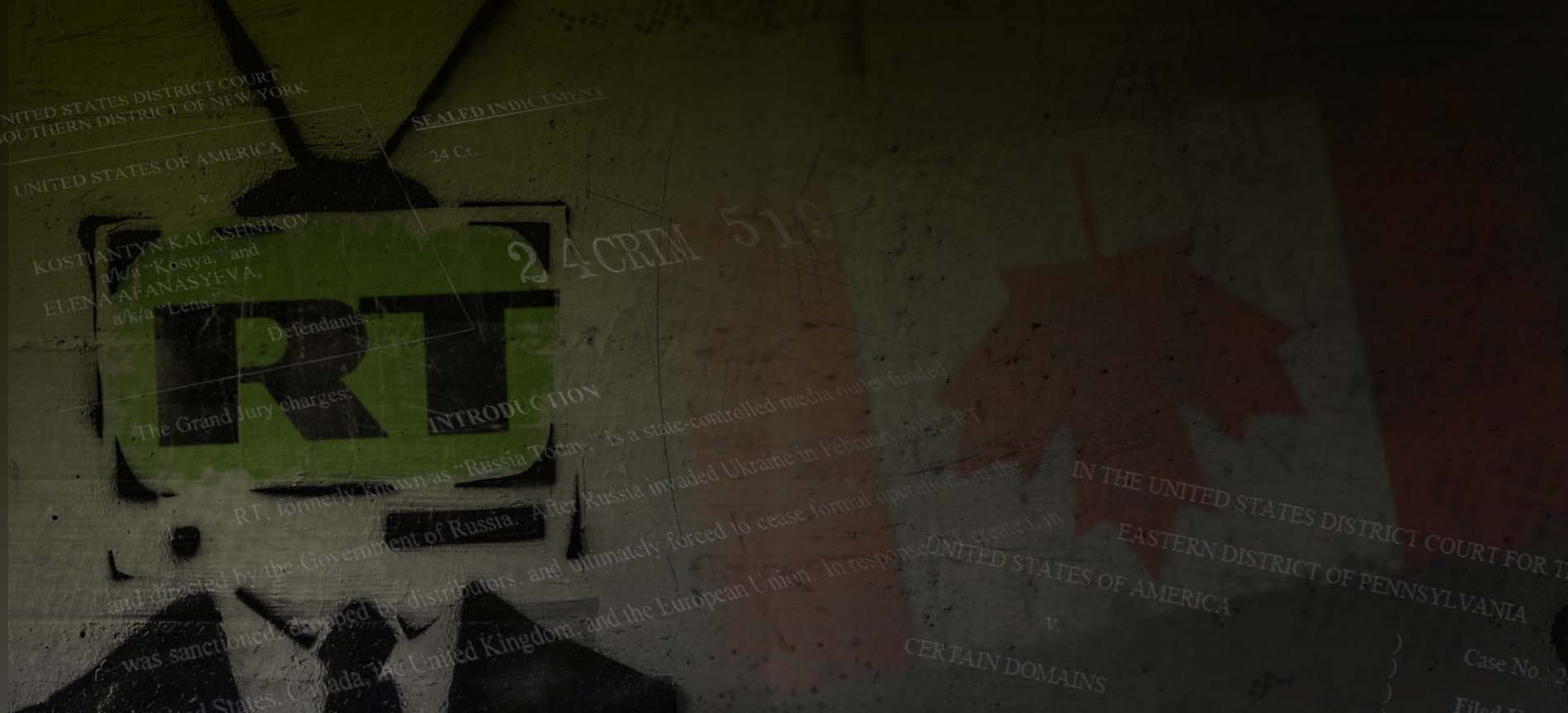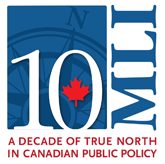This report was written as an incident response for The Canadian Digital Media Research Network.
Key takeaways:
- The Kremlin is extremely motivated to influence and manipulate the Canadian and US political information environment.
- Canadians were identified as key individuals in this operation in potential contravention of Canadian sanctions laws.
- RT employees freely directed the development of content, narratives and tone on the Tenet platform and among collaborating influencers.
As outlined in CDMRN’s initial incident notification on September 4, 2024, the U.S. Department of Justice (DOJ) indicted two RT employees for their involvement in a covert propaganda scheme targeting North American audiences, facilitated by a company (Tenet Media) allegedly founded by two Canadians and employing a Canadian far-right social media influencer. This indictment surfaces the need to better understand the clandestine nature of the Russian government’s information and influence operations and the broad reach of these campaigns. In this case, RT—recognized by both the U.S. and Canadian governments as a key component of Russia’s intelligence apparatus—was used to organize, fund, and direct a platform targeting English-speaking North American audiences with far-right political content. Well known influencers with large existing audiences were identified, recruited and leveraged to transmit narratives that were aligned with Russian government objectives.
This investigation aims to explain the connection between RT and Russian information and influence operations over time and describe its influence, clarify the objectives behind these operations, and situate this case in the Canadian context identifying the relationship with and impacts on Canada.
RT’s Role in Russian Information and Influence Operations:
RT was founded in 2005 by the Russian government’s RIA news agency. RT is a Russian state-supported and controlled media outlet that is used to advance and promote Russian government narratives on a wide range of domestic Russian and foreign issues using a mix of some factual reporting, disinformation and propaganda. It presents itself visually as a conventional media outlet to lend credit to the platform and reach a wide foreign audience. The US DOJ indictment states that “RT has pursued malign influence campaigns in countries opposed to its policies, including the United States, to sow domestic divisions and thereby weaken opposition to Government of Russia objectives.”
On September 13, 2024, The US Secretary of State, Anthony Blinken declared that RT functions “like a de facto arm of Russia’s intelligence apparatus”. Canada’s Minister of Foreign Affairs, Melanie Joly stated “RT has become actively engaged in Russia’s global disinformation and influence efforts by acting as an extension of Russian intelligence services, relying on state-backed hacking, psychological and information operations, covert influence and military procurement.”
RT has been banned from Canada’s public airwaves, cable and satellite systems and was placed on Canada’s sanctions list in July 2022, which outlaws the provision of any service to RT (and all other Russian state media channels). Unlike the EU, which has banned RT from its internet—including social media—RT’s English and French language websites, along with its social media accounts, remain accessible in Canada, and its videos are hosted on the Canadian platform Rumble.
RT’s editor-in-chief, Margaret Simonyan, declared in February, 2024, that RT’s covert network continues to influence public opinion in the West despite bans on its broadcasts. Simonyan said that Russia was “able to build an enormous network, an entire empire of covert projects that is working with the public opinion, bringing truth to Western audiences,” emphasizing that RT’s network of clandestine projects are crucial in disseminating Russian-aligned narratives to Western audiences.
Objectives of Kremlin Information and Influence Operations in Canada
The primary objectives of Russian information and influence operations targeting Canadians are to erode public support for Ukraine and to undermine our democracy through polarizing narratives, communicated through both official state media channels, proxies and a large network of influencers.
An affidavit released by the FBI on September 4, 2024, related to the Russian Doppelganger campaign, includes high-level strategic documents from the Russian Presidential Administration. These documents detail the objectives, tactics, techniques, and procedures employed by the Kremlin to achieve its goals.
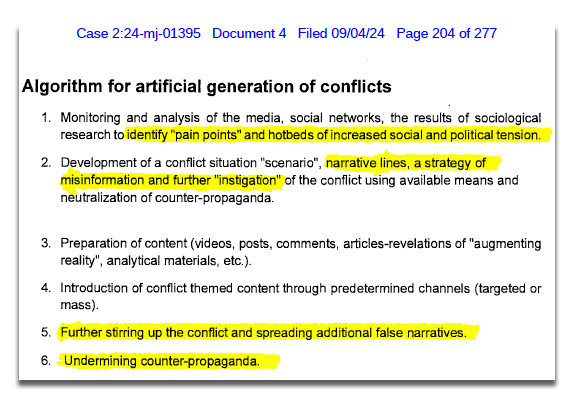
Screenshot of translated Kremlin document outlining the steps for identifying existing or creating polarizing issues and events in Western nations and directives on how to exploit them.
One of the Kremlin documents outlines a project aimed at inciting international conflict by identifying polarizing issues within countries allied with the United States and exacerbating internal tensions within them. This strategy involves creating false narratives and pro-Kremlin propaganda, which are disseminated into Western information environments through influencers, YouTube videos, and various social media platforms.
According to the affidavit, 2800 people have been identified by the Kremlin in 81 countries as friendly influencers – many of whom work in think tanks, media and academia. These influencers are a key component of Russia’s influence operations.
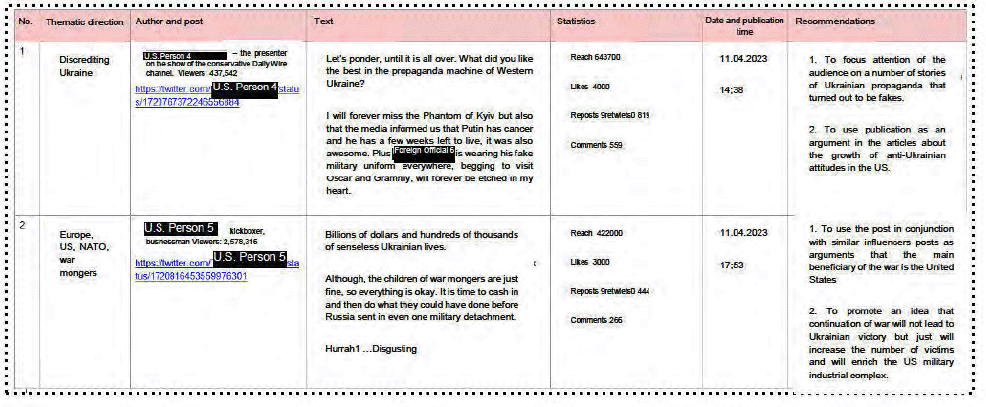
Screenshot of a translated Kremlin document that gives examples of Western influencers amplifying pro-Kremlin/anti-Ukrainian narratives. Photo:DOJ/FBI
Involvement of Canadians and Potential Legal Violations
According to the US DOJ indictment, Canadian individuals and entities played significant roles in the creation and operations of the new media company, Tenet Media. This included content production directed by RT employees, who actively influenced narrative direction. It also included the involvement of Canadian entities in financial transactions linked to RT’s parent organization, ANO TV-Novosti. The scheme may have violated Canadian sanctions laws and Canada’s C-70 legislation and the Foreign Influence Transparency Registry.
RT Funding and Content Strategy
The DOJ indictment notes that Tenet Media received approximately $10 million USD to promote and amplify content and themes that aligned with Russian state objectives. RT employees, Kostiantyn Kalashnikov and Elkena Afanasyeva, directed content specifically aimed at amplifying divisions within Canadian and U.S. society, aligning with Russia’s broader strategy of weakening Western opposition to its actions, and eroding public and government support for Ukraine.
Sovereignty of Canada’s Information Environment:
Content produced under these covert operations targeted Canadians, threatening the sovereignty of Canada’s information environment. More than 2,000 videos created by Tenet Media garnered over 16 million views on YouTube, showcasing the broad reach and influence of Russian narratives masked as independent journalism. Many of these videos included polarizing content specifically targeting Canadian issues.
 For example, a video posted to the Tenet channel on the Rumble video platform titled “Canada Is Becoming A COMMUNIST HELLHOLE: Kat Kanada Interview” compares Soviet-era bread queues, with all queues in Canada to suggest that Canada is becoming “a communist hellhole”. The video has had 27,600 views on Rumble. Since all Tenet Media videos have been removed from YouTube, we accessed an archived, September 5, 2024, version of the YouTube video and found that it had received 29,000 views. A segment of the same video posted to the Tenet Media Twittter/X account has received 79,100 views as of September 17, 2024.
For example, a video posted to the Tenet channel on the Rumble video platform titled “Canada Is Becoming A COMMUNIST HELLHOLE: Kat Kanada Interview” compares Soviet-era bread queues, with all queues in Canada to suggest that Canada is becoming “a communist hellhole”. The video has had 27,600 views on Rumble. Since all Tenet Media videos have been removed from YouTube, we accessed an archived, September 5, 2024, version of the YouTube video and found that it had received 29,000 views. A segment of the same video posted to the Tenet Media Twittter/X account has received 79,100 views as of September 17, 2024.
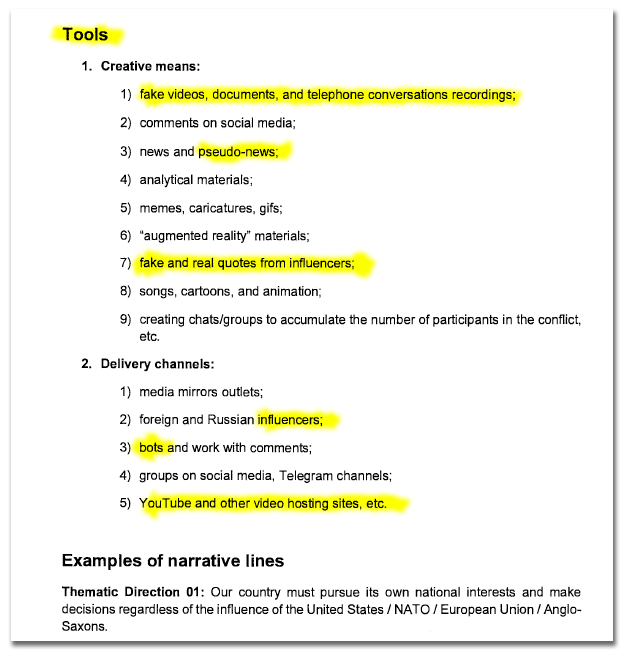
Kremlin Document translated by FBI outlining the tools, tactics and platforms used to transmit Kremlin disinformation.
Services Provided to RT:
A key piece of evidence cited in the DOJ indictment involves a contract between RT’s parent company ANO TV-Novosti and a Canadian company, identified as “Canadian Company-I,” owned by a Canadian identified as Founder-1.
Between March 2021 and February 2022, one of the Canadian founders of Tenet media is alleged to have created 25 opinion articles for RT under this contract, many of which were overtly pro-Russian and anti-Ukrainian. RT created a dedicated page to feature the content produced by this individual.
From October 21 to May 2022, the other Canadian founder of Tenet media is alleged to have worked with RT’s German subsidiary Ruptly.
According to the indictment, the two Canadians “also invoiced U.K. Shell Entity-I more than $760,000 for their own fees and commissions, some of which they asked to be paid to Canadian Company-I’s bank account in Canada.”
Between January and June 2024, RT employee, Elena Afanasyeva, posted links to approximately 841 video clips and directed employees of Tenet Media to blame Ukraine for the ISIS attack on a Moscow theater to undermine western support for Ukraine.
Kostiantyn Kalashnikov, another key figure identified in the indictment, managed multiple RT covert distribution channels and edited content for U.S. Company-1 without disclosing his RT affiliation. His involvement exemplifies the concealed tactics used by RT to manipulate Western media landscapes, using trusted local figures to lend credibility to disinformation campaigns.
Concluding Summary and Recommendations
The indictment of RT employees by the U.S. Department of Justice exposes the depth and complexity of Russia’s covert propaganda operations targeting North American audiences, which are facilitated through media entities like Tenet Media, which involved Canadians in potential violations of Canadian sanctions laws.
In addition, the FBI affidavit and investigation into the Russian Doppelganger campaign highlights the Kremlin’s extensive efforts to manipulate and influence Western political information environments.
RT’s strategic use of clandestine funding, deceptive practices, and international recruitment underscores its role as a tool of the Russian intelligence to promote disinformation, sow division, and undermine Western democratic institutions. Despite sanctions and bans, RT’s content continues to infiltrate Canadian media platforms, threatening the sovereignty of Canada’s information environment and threatening to erode the cohesion of Canadian society.
Russian state controlled media platforms, their clandestine proxies and think tanks are key vehicles in transmitting Russian narratives in to Western information environments.
Canadians who collaborate with sanctioned Russian state media outlets and think tanks, should be investigated and identified to reduce the impact of Russian information operations in Canada and ensure transparency within our information environment.
Recommendations
Basic Sanctions Enforcement:
RT and other Kremlin-controlled state media and think tanks were added to Canada’s sanctions lists in 2022-23. Canada must rigorously investigate suspected violations of these sanctions and hold offenders accountable to maintain the deterrent effect and integrity of these measures.
Application of C-70 Legislation:
The government should apply Canada’s C-70 legislation to scrutinize and hold accountable individuals and entities that facilitate foreign state influence and propaganda efforts in contravention of Canadian laws.
Strengthening the Foreign Influence Transparency Registry:
Canada should expedite the implementation and enforcement of the Foreign Influence Transparency Registry to identify and expose Kremlin directed activities that seek to covertly manipulate Canadian public opinion and policy. Transparency and accountability in our political and information environments will reinforce democratic resilience.
Public Awareness Campaigns:
Raising public awareness – among newsroom managers, elected officials and leaders of our political parties – about the tactics used by foreign influence operations is critically important to building resilience against disinformation. This includes educating Canadians on how to identify and critically assess manipulated content, especially on social media platforms.
These measures are vital to protecting Canada’s information environment, safeguarding democratic processes, and maintaining the integrity and sovereignty of Canadian media against covert foreign influence.
